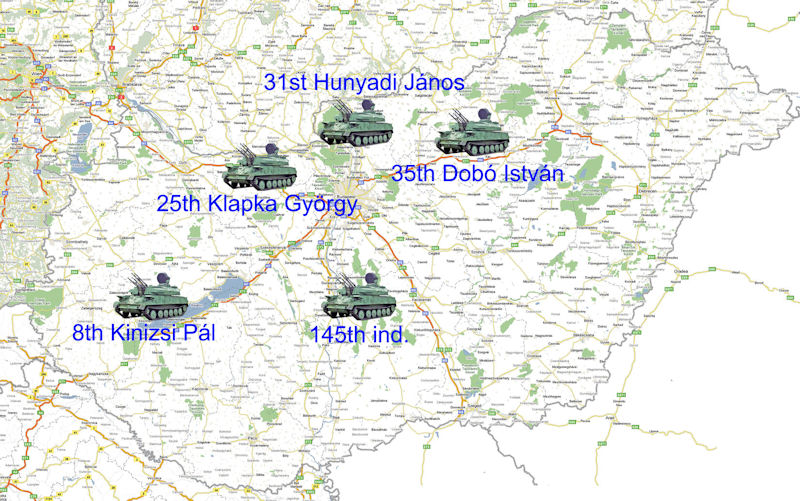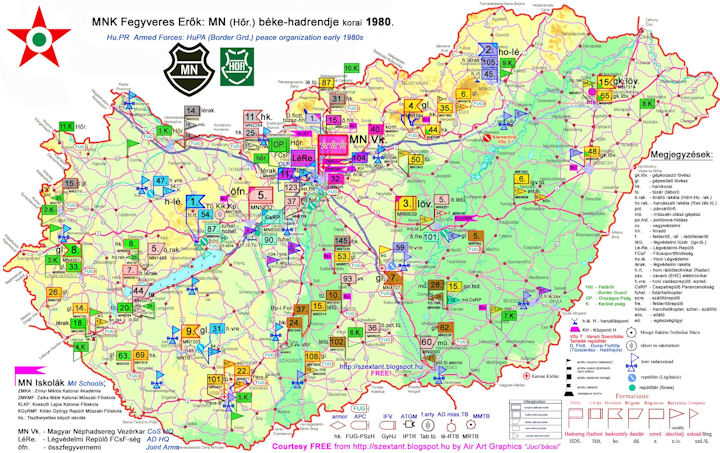Hungarian Land Forces / Magyar Honvédség
 The Land Forces are the main component of the Hungarian Defence Forces. They blend the Hungarian military traditions with the requirements and capabilities of the modern age. The army is the organisation with a concentration of equipment that is indispensable for committing terrorist attacks later (small arms, heavy armament, special weapons, materials classified as chemical weapons, explosives). This arsenal is the living proof that one must expect an increased frequency of terrorist activities against military targets on an international scale.
The Land Forces are the main component of the Hungarian Defence Forces. They blend the Hungarian military traditions with the requirements and capabilities of the modern age. The army is the organisation with a concentration of equipment that is indispensable for committing terrorist attacks later (small arms, heavy armament, special weapons, materials classified as chemical weapons, explosives). This arsenal is the living proof that one must expect an increased frequency of terrorist activities against military targets on an international scale.
The power and the equipment of the land forces enable the units to give effective assistance for the organisations of disaster-relief, as the disaster-relief organisations are the main players in the aftermath of a terrorist attack. Various forces and equipment belonging to the land forces are detailed to the Catastrophe Relief System of the Defence Forces. The level of readiness has also been defined for these organisations.
Besides that, it is essential that the Land Forces units have a continuously updated database, with a subsystem containing information on such capacities, forces and equipment, showing which organisations and materiel are available and deployable at a given time. An Operative Group of Catastrophe Relief has been established with the Land Forces Command at the appropriate level of continuous readiness, in order to analyse such requirements, and to plan, organise and control the relevant tasks.
When shaping the organisation of the Immediately Deployable Force (IDF), the Land Forces was striving to establish a formation, which can be transported by air and independently perform the task thereafter, or when working as a land force component – depending on the mission – can also be complemented with a rapid reaction company or with a reinforced mechanised or mechanised infantry company, if the complexity of the mission calls for that.
The basic concept was developed with respect to the capacities available now. As the special training has been completed, the Land Forces may use sub-units of the reconnaissance battalions as well as those, suitable for air transport of the light mixed regiment. These specially-trained sub-units may be deployed to the site or vicinity of the application by air, and will approach the site where they are needed by a parachute jump, may descend from the aircraft by a winch or may land as assault units. The special cross- country vehicles and the heavy armament of the light mixed regiment (machine guns, METISZ antitank missiles, demolition guns) will also be deployed by air.
The Immediately Deployable Forces will be withdrawn simultaneously with the deployment of the company-size formations, as soon as these have entered into combat in a well-organised way and with success. Units of the light mixed regiment will be withdrawn with the cross-country vehicles that were deployed together with them, units of the reconnaissance battalion will leave by helicopter, while the former sub-unit may also be lifted out with helicopters.
General tasks of the Land Forces
- Armed territorial defence of Hungary.
- To support the deployment of allied forces.
- Performing crisis response (including peace support operations) and humanitarian tasks.
Tasks of the Land Forces in crisis response (non-wartime) operations (CROs)
- Deploying forces assigned to take part in both crisis response operations as defined in Article 4 of the Washington Treaty and peace support missions undertaken in international agreements and providing national support for their operations.
- Transition to wartime establishment in emergency situations.
- Preparing and training wartime establishment personnel.
- Taking part in sustaining the operational capability of the country in emergencies.
- Taking part in disaster relief and consequence management operations.
- Reinforcing units of other branches taking part in military operations.
Peacetime tasks of the Land Forces
- To accomplish and sustain training and readiness representing credible deterrence against any kind of external threat.
- To maintain the level of combat capability and readiness of the units declared to the Alliance.
- To prepare the forces assigned to take part in both crisis response operations as defined in Article 4 of the Washington Treaty and peace support missions undertaken in international agreements. Conducting military operations other than war (MOOTW), combat support and combat service support operations inside and outside Hungary’s territory.
Tasks of the Land Forces in wartime military operations
- Defence operations.
- Providing Host Nation Support.
- Conducting effective combat operations in cooperation with allies or as part of an allied force.
- Taking part in tasks specified in Article 5 of the Washington Treaty.
The Hungarian Defence Forces are the main guarantor of Hungary’s sovereignty and territorial integrity. The Hungarian Defence Forces play a decisive role in the protection of Hungary’s freedom, constitutional order and security against external military threats. Their recognized performance in international operations has a significant impact on Hungary’s international prestige and influence, contributing to the increase of the country’s ability to assert its interests.
The Hungarian Defence Forces must possess the fundaments of the capabilities needed for the armed defence of the country, to be able to expediently develop those capabilities in the case of the deterioration of the security environment. The sovereign national force must be developed gradually in a planned manner taking Hungary’s NATO responsibilities into consideration.
The Hungarian Defence Forces participate in operations that contribute to strengthening the security of Hungary and its Allies. Their external employment takes place upon a legal decision following the proper international legal authorisation, within the framework of international organisations or in an ad-hoc coalition, along common values and interests.
The voluntary reserve system is an integral part of a modern armed force based upon professional and contracted personnel. It provides a framework for the training of our fellow countrymen wishing to take an active role in the defence of the homeland and their employment in peacetime and under special legal order. According to the stipulations in the legal regulations, during a state of national crisis or a state of preventive defence, subject to the decision by the Parliament on introducing military service based on conscription, the Hungarian Defence Forces also rely upon the military service of adult male Hungarian citizens with a residence in Hungary.
The current level of the threat of a conventional attack against Hungary and its Allies is marginal and current processes also underline that in the mid-term. The probability of an attack with the use of non-conventional means with limited purpose is also rather low, however, it cannot be ruled out completely.
The armed force can be employed in the full spectrum of possible operation from low to high intensity. Despite the fact that the Hungarian Defence Forces participate in low intensity international operations today, in the mid-term they must also be capable of being employed in high intensity operations. The employment of the Hungarian Defence Forces generally occurs in crisis management operations, in many cases significantly far from Hungary, under extreme natural and climatic conditions, on terrain difficult to access with no host nation support.
Mass armies are replaced by smaller, flexibly employable armed forces comprised of highly trained soldiers. Instead of wide frontlines, fighting often takes place in populated and built-in areas in the vicinity of civilian populations and infrastructures, against an enemy difficult to identify. Ground manoeuvres of the armed forces are required for establishing direct contact with the opposing party usually not organised in a regular way and its civilian environment and also other actors participating in the crisis management to support the achievement of the desired political objectives.

|
NEWSLETTER
|
| Join the GlobalSecurity.org mailing list |
|
|
|


